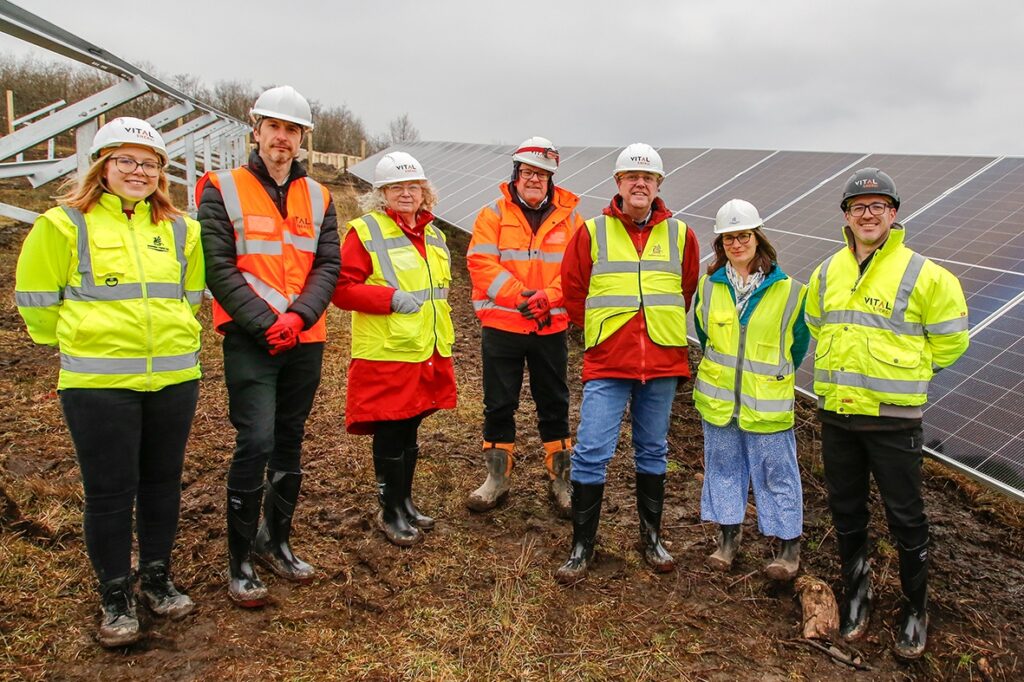Coed Ely solar farm offers glimpse of low-carbon public sector

Works have begun on new solar farm located on old colliery that will see Royal Glamorgan Hospital benefit from low-carbon electricity.
Councillors from Rhondda Cynon Taf Council joined representatives from Cwm Taf Morgannwg University Health Board and Vital Energi to celebrate the commencement of works on the new 6MW Coed Ely Solar Farm in South Wales.
The partnership will help the council reduce carbon emissions, and boost the Royal Glamorgan Hospital’s push to net zero.
When complete, the installation will include over 9,400 panels and be capable of generating 6MWh/year of electricity. Crucially, it will play a key role in helping both Rhondda Cynon Taf Council and Royal Glamorgan Hospital by reducing emissions by over 7,300 tonnes over the project’s lifetime. 5MW of low-carbon electricity will be exported to the grid, while 1MW will be exported to Royal Glamorgan Hospital.
Councillor Tina Leyshon, Cabinet Member for Corporate Services, Youth Participation and Climate Change, said: “It’s fantastic to see the progress on this project as we see the journey towards completing the Coed Ely Solar Farm begin. This ambitious project is providing a unique opportunity to deliver green energy at a significant scale, feeding energy directly into the National Grid and supporting the energy security of our community and the UK.
“By supplying the Royal Glamorgan Hospital with low-carbon electricity, we’re helping to reduce its carbon footprint, making the project even more beneficial and directly supplying our local NHS.
“Additionally, with the site’s reclaimed colliery tip unsuited for agriculture, this project shows how land can be repurposed for clean energy while still supporting local biodiversity. Grazing rights for animals will continue, demonstrating that solar energy projects can coexist with farming and enhance biodiversity.”
The Coed Ely Solar Farm, built on a reclaimed colliery site, showcases how former industrial land can be repurposed for renewable energy generation. The project also includes biodiversity enhancements such as wildlife boxes and habitat corridors, ensuring ecological benefits alongside energy production.

Mark Williams, Vital Energi Partnerships Director explained, “Wales has a strong commitment to meeting its net zero goal and it’s projects and partnerships, like this solar farm, which are bringing us closer to those targets. This is a great demonstration of how the public sector can work together to deliver creative solutions to combat the climate emergency. The core reason we recently opened a dedicated office in Swansea and are expanding our workforce in Wales is so that we can better support our clients as they create more of these fantastic low-carbon schemes.”
Linda Prosser, Executive Director of Strategy and Transformation and Executive Lead for Decarbonisation across Cwm Taf Morgannwg University Health Board, commented: “We are delighted that on peak summer days the whole hospital will be powered by solar energy. This will have a significant positive impact on our decarbonisation and ‘Green CTM’ commitments and how we can deliver healthcare in a sustainable way for future generations. However, this scheme is not the end of the story at the Royal Glamorgan Hospital and we will be delivering more renewables and low carbon technologies in future to further decarbonise the hospital’s energy demands.
Additionally we are proud to work with our partners at RCTCBC and believe that this scheme is a great example of positive collaboration and partnership working between Health Board and Local Authority.”
The project is being delivered by Rhondda Cynon Taf County Borough Council, with Vital Energi acting as the main contractor, supported by Hydrock and Rhomco.
